Band-Aid Work
When I was a little girl, I had a necklace with a small translucent pendant holding a mustard seed. When I asked what this tiny seed meant, my mother told me that if I “had the faith of a mustard seed,” I could move mountains.
None of this made any sense to me. How can a little seed move a mountain? But I loved that necklace and wore it all through elementary school in Chicago.
Later, attending Sunday School as a child, I learned about the parable of the mustard seed in the Gospels of the New Testament. Jesus told the story of the tiny mustard seed growing to be the tallest herb, and spreading throughout the land. These past months I have seen fields of yellow mustard taking over the pastures in southern Arizona. Parables are often difficult for me to figure out, but I believe the story of the mustard seed has to do with large growth from small beginnings, and Jesus was probably talking about his Word spreading far and wide. And indeed, wild mustard probably grows everywhere on the planet.
During these summer months I have seen more than one-hundred migrants seeking shelter at the comedor each Tuesday. In 2011 the comedor served more than 35,000 meals to undocumented pilgrims passing through Nogales.
Samaritans help pass out the plates of food at breakfast, and then sort the clothes for the migrants to pick over, each according to their needs. Afterwards we sit down and talk with the people, trying to figure out the next step. Is it a bus ticket back to Puebla? A trip to the first aid station for some needed care for blistered feet? Or simply sitting with a person who is desperately trying to reach his family in New York City.
In the big scheme of things, it feels like applying a band-aid to a suppurating wound. It feels like dousing an erupting volcano with a garden hose. It feels like offering clean socks to someone who is about to walk through fire.
A very thin man in a bright red shirt gave me a small smile last week, and as I approached he invited me to sit with him on the long bench. He had several missing front teeth, visible scars on his arms, and an angular emaciated body. His name was Cesar. He was bent as he walked and was unable to straighten his neck. Beaten and tortured, Cesar cannot return to his home in Guatemala. He has been hopping trains for eight days to arrive at this place. He is seeking asylum in the U.S. When I asked him why, he told me that his entire family has been murdered in Guatemala.
“There are many gangs. There are drugs. I cannot go back or they will kill me.”
Being so far from his homeland, I commented on his courage in traveling such a great distance to this border.
Cesar replied, “When your family is killed, you have no place to cry.”
Asking how to find the “Office of Human Resources,” the Samaritans directed Cesar to a nearby office where he can begin this process. And here are the sad facts about seeking asylum as a refugee from the drug wars and violence in Latin America. In 2011, only 2% of the applicants from Mexico were granted asylum to the U.S. (Global Post, Sept. 15, 2011) In Guatemala, 4.5% of the total applicants were granted asylum, with 3,458 applying. (Guatemala Human Rights Commission, 2009) The war that the Mexicans are experiencing, caused entirely by the drug use in the United States, does not translate into a coherent narrative that immigration judges can use to grant political asylum. This is why so few cases are successful.
And today I felt like I applied a band-aid to the wounds of a man who has experienced more tragedy than I could ever imagine. Our Samaritan group can offer things—clothes, a nourishing breakfast, perhaps the use of a cell phone. But today we can not change the political process of our country to help Cesar. We can not change the structure, which is perhaps where real help can be found.
I would like to think that the activity of serving food, distributing clothes and listening to the stories of migrants is impacting political policy. Perhaps band-aid work is a way to change policy. Maybe there is a ripple effect. Like the mustard seed, I believe that small things matter. Instead of cursing the government, the politicians, and the broken immigration policy (which I do ad nauseam), maybe showing up each week at the comedor makes a difference. Do little things, extend a helping hand, and have faith that big things will happen. But do something.
There was a slow drizzle of rain on the day I met Cesar, and the migrants who were lined up outside the comedor were getting wet. The Jesuit priests let the travelers into the shelter while we were sorting the clothes. They lined up in rows on one side of this small space, and I remarked that they all looked like a choir getting ready to sing. A few moments later, much to my amazement, the group broke into song, singing “Cielito Lindo,” (Heavenly Sweet One) a popular Mexican ranchero song. When the migrants came to the most famous part, “Ay, ay, ay, ay….Canta y no llores,”, (Sing and don’t cry…), the whole room joined in.
It was one of those incongruous moments when tragic stories and situations are somehow transcended through music and good people.
These vulnerable and forgotten travelers had no material possessions on this gray, drizzly day, but they had human dignity, and in this moment, there was joy. These people are tough. And they can sing.
Engaging in the world of the poor and disenfranchised makes life unpredictable. The Samaritans never know what to expect when we volunteer each week. I am reminded when I go to the comedor that in the midst of our consuming and comfort-oriented society, people are more important than stuff. I meet people who drink out of cow troughs on their journey to the United States. I talk to women who are six months pregnant and have climbed over the border wall.
They will most likely do menial, backbreaking work and live in small crowded rooms. They will have dreams for their children, and their children’s children. And I will remember them singing “Cielito Lindo” on a rainy day, with gusto and hope.
Read more about the Green Valley Samaritans at: www.gvsamaritans.org All donations are tax deductible. We are an all-volunteer organization committed to changing immigration policy and preventing deaths in the desert.

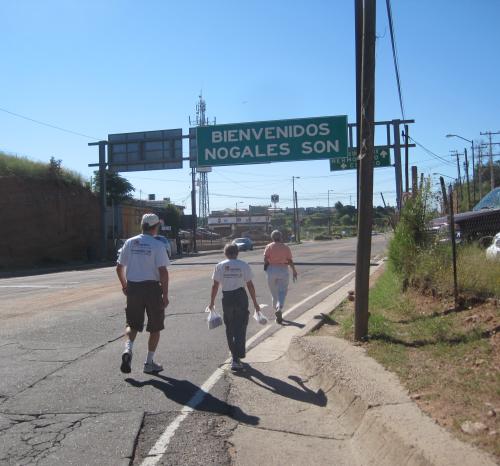
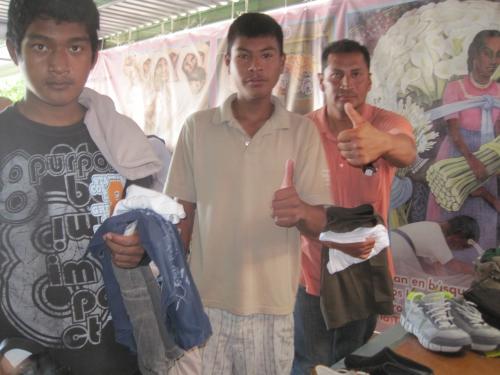
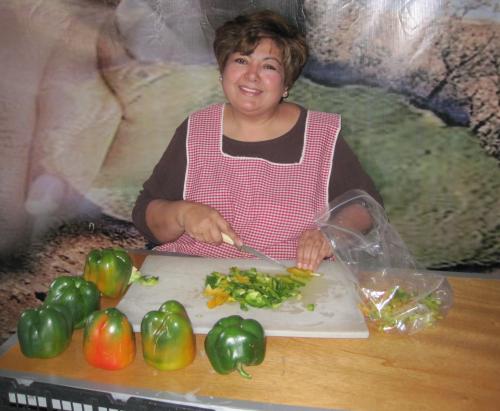
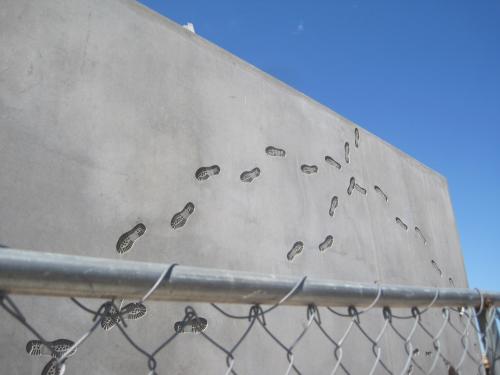
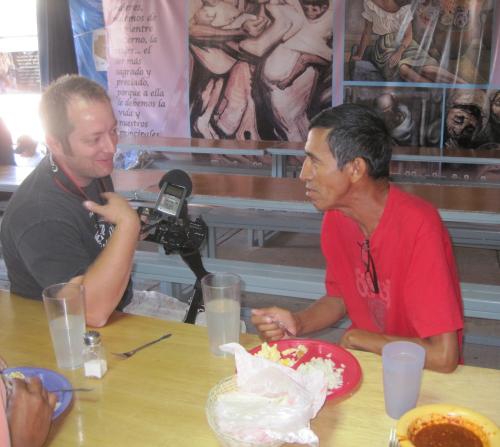
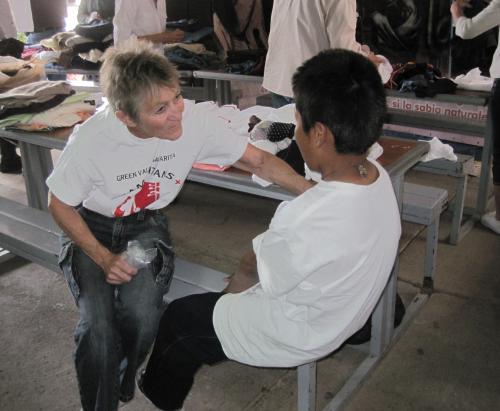
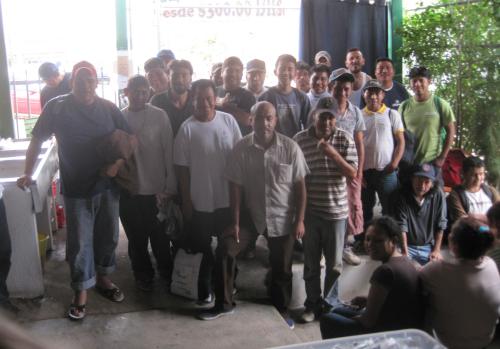
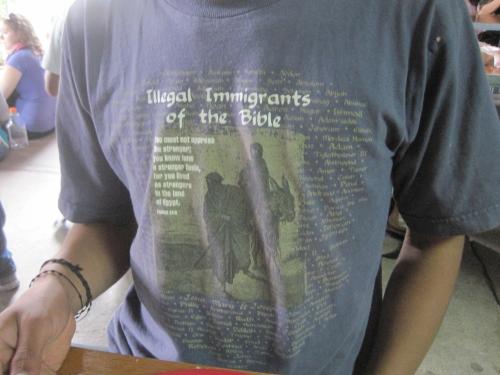
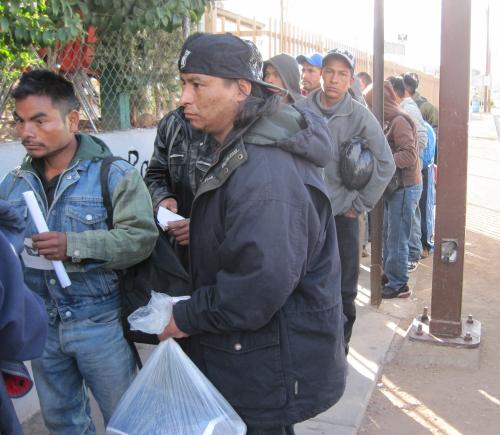

Beautiful. I have tears on my cheeks!
As I read of your work of the comedor I am reminded of the small boy running up on the beach and then running back to the gently rolling waves on the beach. The young boy repeated this over and over all the while being observed by an old beach bum. Finally the older man approached the boy and asked him what he was doing. The young boy replied, “Saving the starfish.” The man pointed out that there were so many starfish stranded on the beach that the young boy could not possibly make a difference. As he continued to run up the beach and back into the surf he put yet another starfish in the ocean. He turned to the old beach bum and simply said, “It made a difference to that one”. You may feel like a band aid but you make a difference to that “one”. God bless you and your compatriots for all you do for humanity and these struggling souls seeking the chance for a better life.. There is a special place for all of you.
Peg — Lucky for us that you’re cooking up and ladling out such nourishing prose from your inspiring work at the comedor. Keep that menudo coming! — Merrill
So beautiful I posted this on our church’s facebook page. I want to share and keep on sharing, just like your mustard seeds!
Cesar’s story reminds me of my great-grandfather’s. He and his family were living in a small village in Mexico, and one day he and a friend went fishing. When they returned, he found that his entire family had been murdered.
When I heard that story, I thought it was terrible, but it also feels so long ago and so far away. It’s disgusting and horrible that people still have to suffer in this way.
I used to have a mustard seed pendant, too. I believe in that ripple effect.
Raquel,
The story of your great-grandfather’s tragedy is horrific. I am having trouble coming up with the words to describe how I felt reading this. It just slammed me against the wall. I do appreciate your sharing this bit of family history with me. –Peg